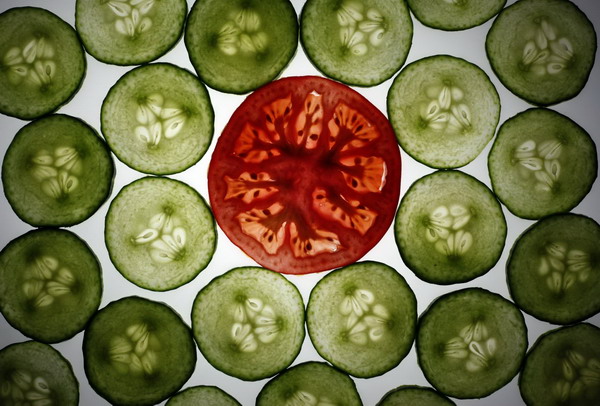Society
Germany: Searching for bacterial outbreak source
Updated: 2011-06-01 17:21
(Agencies)
|
 Slices of cucumber and a tomato slice are pictured in this illustration photo taken in Berlin May 30, 2011. [Photo/Agencies]
|
|
||||
Agriculture Minister Ilse Aigner said scientists are working nonstop to find the source of the unusual strain of the E. coli bacteria that is believed to have been spread on tainted vegetables - and where in the long journey from farm to grocery store the contamination occurred.
"Hundreds of tests have been done and the responsible agencies ... have determined that most of the patients who have been sickened ate cucumbers, tomatoes and leaf lettuce and primarily in northern Germany," Aigner said on ARD television. "The states that have conducted the tests must now follow back the delivery path to see how the cucumbers, or tomatoes or lettuce got here."
German authorities initially pointed to a few cucumbers from Spain, but further tests showed that those vegetables, while contaminated, did not cause the outbreak. But officials are still warning all Germans to avoid eating raw cucumbers, tomatoes or lettuce.
E. coli is found in large quantities in the digestive systems of humans, cows and other mammals. It has been responsible for a large number of food contamination outbreaks in a wide variety of countries. In most cases, it causes non-lethal stomach ailments.
But enterohaemorrhagic E.coli, or EHEC, causes more severe symptoms, ranging from bloody diarrhea to the rare hemolytic uremic syndrome. In Germany, at least 373 people have come down with the syndrome, or HUS, in which E. coli infection attacks the kidneys, sometimes causing seizures, strokes and comas.
The World Health Organization said that as of Tuesday there had been 400 cases of HUS and 843 cases of EHEC in nine European countries: Austria, Denmark, Germany, the Netherlands, Norway, Spain, Sweden, Switzerland and the UK. All but two cases are either people in Germany, or people who had recently traveled to northern Germany, the organization said.
It's "extraordinary" to see so many cases of the kidney complication from a foodborne illness, said Dr Robert Tauxe, a foodborne disease expert at the US Centers for Disease Control and Prevention. "There has not been such an outbreak before that we know of in the history of public health."
He added that the strain of E. coli in the European outbreak has not been seen in the United States, where there have been several high-profile foodborne outbreaks in recent years, but none with such a high death toll.
There's little precedent in Europe, either. In 1996, an E. coli outbreak in the United Kingdom caused 216 cases and 11 deaths.
The World Health Organization said 86 percent of those sickened in the current outbreak were adults, and two-thirds were women. It said it was unusual that more children weren't affected.
Specials

China Daily marks 30th birthday
China's national English language newspaper aims for a top-notch international all-media group.

Room at the inn
The Chinese hotel industry experiences a building boom, prompting fears of oversupply.

Pearls of wisdom
Chinese pearl farmers dominate the world market but now want to work smarter, not harder


